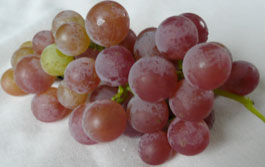News
Archive for February, 2011
Beware – Human food that can poison your pet….
by on February 24th, 2011
Category: News, Tags:
Everyone has heard the message about chocolate being toxic to pets, and hopefully Easter will pass without too many canine fatalities across the UK (and yes, they do happen: it isn’t just media hype). But what about other food items that are safe for humans, yet capable of causing severe or even lethal intoxications in animals?
Recently our clinic witnessed a young border terrier die as a result of the toxic effects of eating raisins. Grapes and raisins may seem innocuous, but all fruits of the Vitis vinifera (grapes, raisins, currants and sultanas) can, surprisingly, cause severe fatal renal failure in dogs. Currently the mechanism of action remains unknown, as does the “toxic dose”.
Some dogs seem able to eat large quantities without any effects, while others develop renal failure after as little as a few grapes or a small handful of raisins. Analysis of data to explain why some dogs are susceptible and others are not has to date been unsuccessful. In fact it wasn’t until 2001 that the first article was published in the USA about their potential toxicity to dogs. In the UK, there were 23 cases between 2003 and 2005. We would urge every dog owner to seek veterinary attention should their dog have eaten grapes or raisins and advise that their pet be treated intensively in an attempt to reduce any potential for onset of renal failure. Bear in mind that these fruits may find their way into many seasonal foods such as Christmas cake, Christmas pudding, stollen and mince pies, to name but a few.
Here’s a brief review of the main remaining food items to avoid giving to your pets:
Peanuts (including monkey nuts) have been reported to cause adverse effects in some pets. Most symptomatic animals develop gastrointestinal signs and in a small number of cases twitching, muscle spasm, agitation, hallucinations and occasionally convulsions can occur. Macadamia nuts also contain a toxic compound that has not yet been identified; they’ve been associated with lethargy, weakness and collapse in dogs when eaten in moderate amounts. Be aware that chocolate-coated peanuts and macadamia nuts are also to be avoided.
Allium species (onions, garlic, leeks, shallots, chives) can cause toxicity, even when cooked. Initially there are gastrointestinal signs followed by haemolytic anaemia from 1-5 days. Christmas foods to avoid are onion gravy and sage and onion stuffing.
Mouldy food (e.g. mouldy walnuts, bread, cheese) can contain toxins that cause rapid onset convulsions with tremors, vomiting, hyperaesthesia and rigidity.
Xylitol, an artificial sweetener, is found in some chewing gums, toothpastes, lozenges and medicinal products and can also be bought by the bag load to sweeten home cooking. Unfortunately although healthy for humans it can cause hypoglycaemia and liver failure in dogs.
Avocado is consumed by people all over the world, but all parts of the avocado tree and fruit contain a component called persin that can cause damage to cells in the heart and the mammary gland in birds and animals.
Hops have sometimes been eaten by dogs when they’ve had access to waste that’s been left over after home brewing; it contains a number of compounds that may be toxic. Affected dogs suffer from a syndrome known as malignant hyperthermia, with the body temperature shooting up soon after hops ingestion. Emergency treatment is as important as if a dog has overheated due to being left in a parked car on a sunny day.
Salt is safe as a seasoning agent, but when pets ingest large quantities they can be fatally poisoned. This only happens rarely: case reports include a Boxer that drank huge amounts of salty water while swimming in the sea, a group of dogs that ate play dough, and a Doberman that was given 10 teaspoonfuls of salt by her owner in an effort to make her sick after she’d eaten chocolate.
There are other foodstuffs that can cause problems. Adult pets lack the enzyme to digest lactose, so large quantities of any dairy product commonly cause diarrhoea. Raw egg whites can also upset the digestion, so should be given in moderation, if at all. The stones of many fruits (apples, pears, plums, apricots, peaches, nectarines and cherries) contain a compound that can be toxic if they’re cracked open and swallowed. Some raw vegetables (including cassava, common beans and runner beans) contain substances than can damage the digestive tract.
Finally, alcohol can be poisonous for pets, just as for humans. A couple of measures of whisky would be more than enough to cause severe poisoning to a small dog. In one bizarre case, reported in 2008, a dog in Austria suffered from alcohol poisoning after eating half a kilogram of raw yeast dough. The fermentation of yeast in the digestive tract had produced enough ethanol to cause the dog to have a blood alcohol level higher than the legal limit for driving. (By the way, raw dough is best avoided for another reason: it can expand inside the digestive tract, causing a blockage.)
Cats, although sometimes more sensitive for their size, are less commonly poisoned than dogs: they’re more fastidious in their eating habits. Dogs, especially some breeds (you know who I mean, Labrador-owners) can have unstoppable appetites, with no discernible “off-switch”, which makes them particularly prone to problems.
Pet of the Month – February
by on February 24th, 2011
Category: Pet of the Month, Tags:
When O’riley, a three year old Flat-Coated Retriever, first suffered from severe vomiting and abdominal pain initial investigations were unrevealing. He would settle after a period of medication and return to normal for a few days but then the symptoms would again return. Blood samples, radiographs and ultrasonography would not identify the source of his trouble. Finally O’riley underwent endoscopy in which a fibre-optic tube is passed down into the stomach, under general anaesthesia, and beyond to take tissue samples and visualise the gastrointestinal lining. Inflammatory bowel disease was diagnosed and we are delighted to say that O’riley is responding well to treatment.



